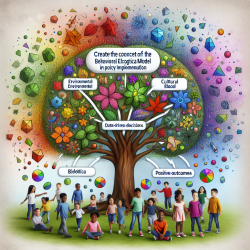Breaking Down Barriers: Enhancing Mental Health Service Delivery
In the realm of global mental health, effective service delivery is crucial for promoting mental well-being and addressing mental health issues. A recent study titled "Barriers and drivers to service delivery in global mental health projects" sheds light on the challenges and facilitators of implementing mental health services worldwide. This blog explores the key findings of the study and offers actionable insights for practitioners looking to enhance their service delivery strategies.
Understanding the Barriers
The study identifies several barriers that impede the effective delivery of mental health services, particularly in low- and middle-income countries (LMICs). These barriers include:
- Human Resource Shortages: A lack of trained mental health professionals and specialists is a significant hurdle, especially in LMICs.
- Cultural Inappropriateness: Many existing screening tools and interventions are not culturally adapted, leading to ineffective service delivery.
- Integration Challenges: Difficulties in integrating mental health services with existing healthcare systems often result in fragmented care.
Leveraging Drivers for Success
Despite these challenges, the study also highlights several drivers that can facilitate successful service delivery:
- Formative Research: Conducting formative research to culturally adapt mental health interventions is crucial for improving their effectiveness and acceptance.
- Recruiting Local Providers: Engaging local providers who understand the cultural context can enhance the sustainability and impact of mental health services.
- Utilizing mHealth: Mobile health technologies offer innovative solutions for improving screening, monitoring, and data management, thereby reducing workforce burden and enhancing service delivery.
Implications for Practitioners
For practitioners in the field of mental health, these findings offer valuable insights for improving service delivery:
- Invest in training programs to build a skilled workforce capable of delivering culturally appropriate mental health services.
- Incorporate formative research into the development and adaptation of interventions to ensure they meet the cultural and contextual needs of the target population.
- Explore the potential of mHealth solutions to streamline service delivery processes and enhance the reach and effectiveness of interventions.
By addressing these barriers and leveraging the identified drivers, practitioners can enhance the quality and impact of mental health services, ultimately leading to better outcomes for individuals and communities.
To read the original research paper, please follow this link: Barriers and drivers to service delivery in global mental health projects.










